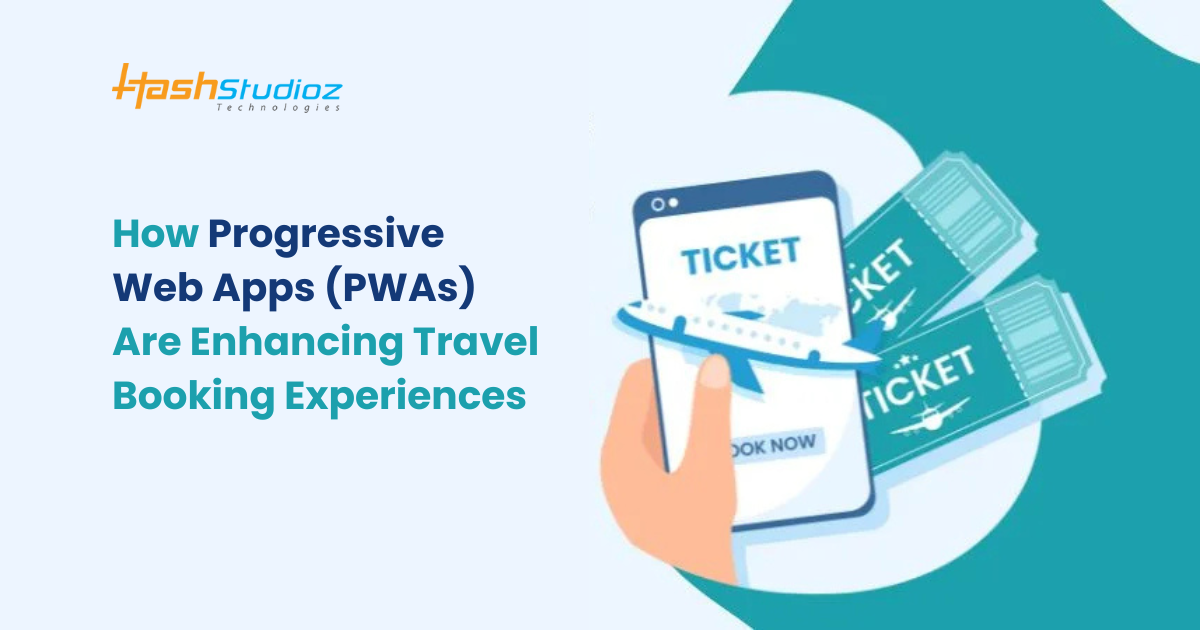travel

March 27,2025 • 4 min read
How Progressive Web Apps (PWAs) Are Enhancing Travel Booking Experiences

The digital transformation of the travel industry has reshaped how travelers plan, book, and manage their trips. With the rise of travel technology services, businesses are constantly innovating to provide a seamless, efficient, and engaging user experience. One such groundbreaking innovation is the Progressive Web App (PWA), which bridges the gap between web and mobile apps, offering a fast, reliable, and immersive experience.
-
53% of users abandon sites that take longer than 3 seconds to load. PWAs solve this issue with fast-loading pages.
-
PWAs increase user engagement by 50% compared to traditional websites.
-
Businesses that implement PWAs experience a 36% higher conversion rate.
-
Travel apps see a 40% reduction in bounce rates after switching to PWA.
Understanding Progressive Web Apps (PWAs)
What Are PWAs?
Progressive Web Apps (PWAs) are a new generation of web applications that combine the best features of websites and mobile apps. They provide a native app-like experience within a browser, eliminating the need for users to download an app from the app store. PWAs leverage modern web technologies to deliver a smooth, engaging, and responsive experience.
Key Features of PWAs
-
Offline Functionality: PWAs work even with limited or no internet connection.
-
Fast Loading Speed: Optimized for performance, PWAs load instantly.
-
App-Like Interface: Provides an immersive, native app-like experience.
-
Push Notifications: Keeps users engaged with timely alerts.
-
Secure & HTTPS Compliant: Ensures data security.
-
No App Store Dependency: Easily accessible via a web browser.
The Role of Travel Technology Services in PWAs
Travel technology services play a crucial role in implementing PWAs for travel businesses. These services ensure:
-
Seamless integration of booking engines and APIs.
-
Enhanced security features for safe transactions.
-
AI-powered personalization for tailored travel recommendations.
-
Cloud-based storage for better data management.
How PWAs Enhance Travel Booking Experiences
Faster Loading Speed
PWAs use service workers to cache content and deliver instant page loads. This eliminates the frustration of slow-loading travel websites, ensuring a smooth booking experience.
Offline Functionality
PWAs allow users to browse destinations, check bookings, and access itineraries offline. This is particularly useful for travelers in areas with weak network coverage.
Improved User Engagement
With features like push notifications, PWAs keep travelers informed about:
-
Flight status updates
-
Exclusive travel deals
-
Booking confirmations
Enhanced Security
PWAs use HTTPS encryption to protect user data and transactions, making them more secure compared to traditional websites.
Cost-Effective Development
Unlike native apps, PWAs require a single codebase, reducing development and maintenance costs. Travel businesses save money while reaching a broader audience.
Personalized User Experience
Through AI and machine learning, PWAs offer personalized travel suggestions, improving the overall user experience.
PWAs in the Travel Industry
1. Trivago
Trivago’s PWA boosted user engagement by 150% and led to a 97% increase in click-through rates, significantly improving conversions.
2. MakeMyTrip
Their PWA achieved 38% faster load times, resulting in a 160% increase in user sessions and a 20% rise in conversion rates.
3. Airbnb
By adopting PWA, Airbnb saw a significant boost in booking efficiency, a 30% increase in repeat visits, and an enhanced mobile user experience for travelers.
The Future of PWAs in Travel Technology Services
-
Integration with AI and Chatbots – AI-powered chatbots in PWAs will provide instant customer support, assisting travelers with bookings, itinerary changes, and real-time queries.
-
Voice Search Optimization – Travelers will be able to search, book flights, and reserve hotels using voice commands, making travel planning more seamless and hands-free.
-
Augmented Reality (AR) for Immersive Travel Experiences – PWAs may integrate AR-guided virtual tours, allowing travelers to explore hotels, destinations, and attractions before booking.
Conclusion
Progressive Web Apps (PWAs) are revolutionizing travel booking experiences by offering faster load times, offline access, enhanced security, and better user engagement. By integrating travel technology services, businesses can leverage the power of PWAs to improve customer satisfaction and drive revenue growth. As the travel industry embraces digital transformation, PWAs stand out as a game-changer, ensuring a seamless and efficient booking experience.
FAQs
1. How do PWAs differ from native mobile apps?
PWAs function like native apps but run in a web browser without needing an app store installation. They provide similar features like offline access and push notifications.
2. Why are PWAs important for the travel industry?
PWAs enhance user experience, improve engagement, and boost conversion rates, making them ideal for travel businesses.
3. Can PWAs work offline?
Yes, PWAs cache essential data, allowing users to browse travel plans and access bookings even without an internet connection.
4. Are PWAs more cost-effective than native apps?
Yes, PWAs require lower development and maintenance costs as they use a single codebase for multiple platforms.
5. How secure are PWAs for travel bookings?
PWAs use HTTPS encryption to protect user data, ensuring a safe and secure booking process.
Gourav Sapra Details
User Profile
- Full name
- Gourav Sapra
- Email address
- gouravsapra24@gmail.com
- Join Date
- 2025-03-25
- State
- California
- City
- Altadena
- Pincode
- 91001-4735
- Address
- 161 W Altadena Dr, Unit 501 STE Altadena CA,
- Follow us on Facebook
- hashstudioz
- Follow us on Twitter
- hashstudioz
- Website Name
- https://www.hashstudioz.com/data-analytics-consulting-services.html
- Bio
- Hey, I am Gourav Sapra and I am a Technical Consultant and Content Creator by profession and working at HashStudioz Technologies.